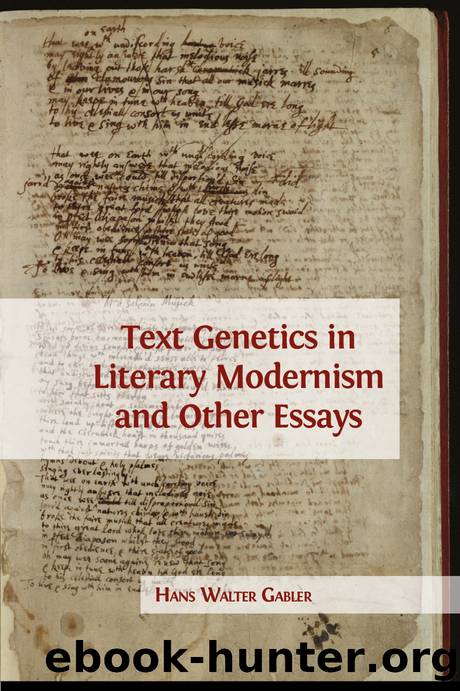Text Genetics in Literary Modernism and other Essays by Hans Walter Gabler

Author:Hans Walter Gabler
Language: eng
Format: epub
Tags: DS, DSK, U; LIT024000, LIT004130, COM087000; textual criticism, genetic criticism, literary criticism, composition, canonisation, book design, digital scholarly editing
Publisher: Open Book Publishers
Published: 2018-02-20T00:00:00+00:00
Intentionalist editing:
some problems of hermeneutics
Clearly, fulfilling the authorâs intentions constitutes a fulfilment, too, of the author-centric orientation and dependency of textual criticism and scholarly editing of the past two centuries that we have been discussing. It goes beyondâindeed, it transgressesâthe foundation in the materialities of transmissions that textual criticism and editing traditionally built and relied upon. For to realise the authorâs intentions means to establish text that is precisely not inscribed in any material document. More specifically still: since it is alone from material documents that written authorial text may be read, the procedure of arriving at the text of the authorâs intention must involve declaring what is written as somehow in error. This may be trivial, wherever, say, the mistake of a scribe, or a typist, or a printing-house compositor can be unambiguously made out and correctedâhardly an editorial measure, though, that were weighty enough to lay claim to fulfilling an authorial intention. Otherwise the making-out of the written as in error involves deeper enquiry. In such cases the scrutiny of the text as documented becomes genuinely interpretative.
This ought to give rise to concerns about the role and expertise of the textual critic and editor. They have but seldom, it is true, been denied critical faculties; nor should they themselves ever abdicate them. The question however is in what modes they should opt to exercise and invest them. The analysis of documents or of collations of texts demands of textual critics and editors critical skills. Such skills, moreover, are absolutely called upon to validate texts and text readings for the purpose of accepting or rejecting them for the edited texts of scholarly editions. Even when, under the ascendancy of the author, an overall responsibility for editorial decisions and results was increasingly delegated to authorsâreal-life authors to bootâand editors consequently tended rather to hide behind the author, their text-specific expertise and skills remained a (usually) sufficiently secure foundation for professionally executed scholarly editions. But when it was further imposed upon editions that they should aspire to fulfil authorsâ intentions, not only was the question left unexplored what extension of expertise and skills this would entail; more fundamentally still, it appears that the intentionalist reconception of textual criticism and scholarly editing was proposed, unaware of the very nature of the imposition. Yet if our critique holds, the Greg-Bowers principles clearly empower the editor not just, as by older dispensations of textual editing, to assess and adjudicate, out of a specialised professionalism, the extant material record of given transmissions. In addition, the principles invest the editor with a hermeneutic dominance over the work. For if under teleological premises the authorâs final intentions enter integrally into configuring the meaning of a text (as the expression of a work), then it follows that it is the authorâs final intentions as supplied editorially that provide the textual capstone to realising the workâs ultimate meaning. This conundrum has a theory dimension that awaits a solutionâunless it is a genuine alternative simply to abandon the intentionalist stance in editorial scholarship.
Download
This site does not store any files on its server. We only index and link to content provided by other sites. Please contact the content providers to delete copyright contents if any and email us, we'll remove relevant links or contents immediately.
The Power of Myth by Joseph Campbell & Bill Moyers(1068)
Half Moon Bay by Jonathan Kellerman & Jesse Kellerman(987)
A Social History of the Media by Peter Burke & Peter Burke(987)
Inseparable by Emma Donoghue(983)
The Nets of Modernism: Henry James, Virginia Woolf, James Joyce, and Sigmund Freud by Maud Ellmann(913)
The Spike by Mark Humphries;(812)
The Complete Correspondence 1928-1940 by Theodor W. Adorno & Walter Benjamin(789)
A Theory of Narrative Drawing by Simon Grennan(782)
Culture by Terry Eagleton(776)
Ideology by Eagleton Terry;(743)
World Philology by(719)
Farnsworth's Classical English Rhetoric by Ward Farnsworth(715)
Game of Thrones and Philosophy by William Irwin(712)
Bodies from the Library 3 by Tony Medawar(709)
High Albania by M. Edith Durham(705)
Adam Smith by Jonathan Conlin(695)
A Reader’s Companion to J. D. Salinger’s The Catcher in the Rye by Peter Beidler(688)
Monkey King by Wu Cheng'en(654)
Comic Genius: Portraits of Funny People by(652)
